Current Affairs
Scotland's National Garden Gets Bigger
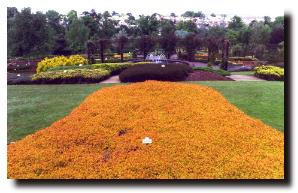 The project to create a National Garden for Scotland on the edge of Perth was officially launched this week. And it was announced that the £40 million Cherrybank Scotland project will incorporate the existing Bell's Cherrybank Gardens. The owners of the garden, drinks company Guinness UDV (who market Bell's whisky), are to hand over their heather garden to the Cherrybank Scotland Partnership and are also gifting the Bell's Visitor Centre with its modern multi-media facilities.
The project to create a National Garden for Scotland on the edge of Perth was officially launched this week. And it was announced that the £40 million Cherrybank Scotland project will incorporate the existing Bell's Cherrybank Gardens. The owners of the garden, drinks company Guinness UDV (who market Bell's whisky), are to hand over their heather garden to the Cherrybank Scotland Partnership and are also gifting the Bell's Visitor Centre with its modern multi-media facilities.
Islanders Win Fight for Gigha
On Tuesday, a resident of the tiny island of Gigha wrote the word "Sold" on the sand to let the world know that the bid by the islanders to buy "God's island" had been accepted by the present owner. Of course, most of the cash to buy the 3,400 acre island, off the coast of Argyll in western Scotland, is coming from the lottery-backed Scottish Land Fund and Highlands and Islands Enterprise. But that was always going to be the case as the residents (adults number less than 100) could never have afforded the selling price of over £4 million. As it was, their bid is believed to have been a million pounds below the highest bid - but the owner nevertheless accepted it. The island will now be owned by a charitable trust - managed by the islanders themselves. But the islanders will have to find a source of finance for a million pounds of the purchase price over the next year. This will then be repaid to the Scottish Land Fund for other projects.
Special Status for River Tweed
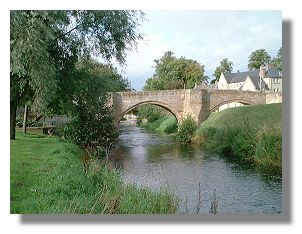 The entire length of the river Tweed, which flows through the Scottish Borders, has been designated a Site of Special Scientific Interest (SSSI). The river rises near Moffat and flows for 97 miles to the sea. Part of its length forms the border between Scotland and England. The river is noted for its salmon population and has a growing number of otters. Parts of the river were previously given SSSI status but now the entire river will be protected
The entire length of the river Tweed, which flows through the Scottish Borders, has been designated a Site of Special Scientific Interest (SSSI). The river rises near Moffat and flows for 97 miles to the sea. Part of its length forms the border between Scotland and England. The river is noted for its salmon population and has a growing number of otters. Parts of the river were previously given SSSI status but now the entire river will be protected
Butterfly Conservation
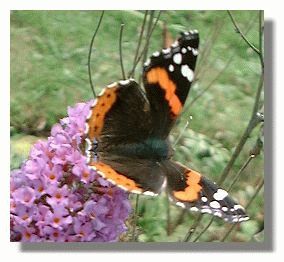 The first conference of the charity "Butterfly Conservation" to be held in Scotland took place this week. The conference heard that if there is not a greater emphasis on biodiversity through agri-environment schemes, the decline in the numbers of butterflies surviving in the countryside will continue. The charity is trying to encourage government to put more money into such schemes. Many farmers are keen to participate but find that the cash allocated by the Scottish Executive falls short of demand. The illustration here is of a butterfly on a buddleia in the gardens of Scone Palace.
The first conference of the charity "Butterfly Conservation" to be held in Scotland took place this week. The conference heard that if there is not a greater emphasis on biodiversity through agri-environment schemes, the decline in the numbers of butterflies surviving in the countryside will continue. The charity is trying to encourage government to put more money into such schemes. Many farmers are keen to participate but find that the cash allocated by the Scottish Executive falls short of demand. The illustration here is of a butterfly on a buddleia in the gardens of Scone Palace.
First Minister Resigns
 After only 12 months in the post, Henry McLeish resigned as First Minister on Thursday. For some time he had been harried about income from sub-letting part of his constituency offices in Fife - while receiving the full cost of the office as part of his parliamentary expenses. Many people eventually accepted McLeish's own assessment that it was more of a "muddle than a fiddle" and that he had not personally obtained any financial benefit. But the way in which the affair was mishandled by the First Minister and his advisers led to "the man in the street" looking askance at the office of First Minister and the Scottish Parliament.
After only 12 months in the post, Henry McLeish resigned as First Minister on Thursday. For some time he had been harried about income from sub-letting part of his constituency offices in Fife - while receiving the full cost of the office as part of his parliamentary expenses. Many people eventually accepted McLeish's own assessment that it was more of a "muddle than a fiddle" and that he had not personally obtained any financial benefit. But the way in which the affair was mishandled by the First Minister and his advisers led to "the man in the street" looking askance at the office of First Minister and the Scottish Parliament.
Even so, everyone expected him to win a vote of "no confidence" after a debate in the Scottish Parliament on Thursday morning. Instead, it was announced minutes before the start of the debate, that it would not take place because Henry McLeish had decided to resign. In his dignified resignation speech he said he was proud of many of his achievements. But he acknowledged that mistakes had been made in the matter of his constituency office sublets and the way the matter had been handled. He added that no-one else was to blame and he took full personal responsibility. He said he had decided to resign so the Parliament and Executive could continue to function with "the minimum of distraction".
Scottish Businesses Not Ready For Euro
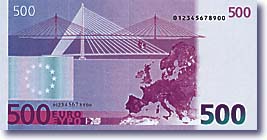 A report from a parliamentary committee has expressed "disappointment" at the low level of preparedness of many Scottish businesses for the introduction of Euro notes and coins in the European Monetary Union next January when 300 million people across Europe will start using the new currency. They called on VisitScotland to ensure that prices were quoted in Euros as well as sterling and on other organisations to get ready for the new currency.
A report from a parliamentary committee has expressed "disappointment" at the low level of preparedness of many Scottish businesses for the introduction of Euro notes and coins in the European Monetary Union next January when 300 million people across Europe will start using the new currency. They called on VisitScotland to ensure that prices were quoted in Euros as well as sterling and on other organisations to get ready for the new currency.
Scottish Retail Spending at Record High
If the UK and Scotland in particular avoid recession in the current economic downturn, it will be due mainly to shoppers continuing to spend at high levels. Sales soared in October and were nearly 8% higher than the same month last year according to the Scottish Retail Consortium. The growth rate was the fastest since the Consortium began publishing figures in 1999. According to opinion polls, shoppers are still likely to spend heavily for Christmas. There has been a slight rise in the number of those claiming unemployment benefit, but not enough to create a general atmosphere of job insecurity. Even so, confidence about the future amongst the management of manufacturing companies has declined sharply, particularly in Scotland. Exports have been particularly badly affected.
First Minister Elected
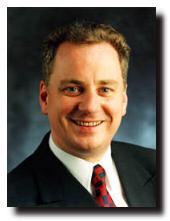 Watched by his wife and family from the public gallery, Jack McConnell was duly elected as the third First Minister for Scotland on Thursday with the support of his Liberal Democrat coalition partners. He obtained 70 votes against a total of 56 for the other three candidates (from the Scottish National Party, Conservatives and an independent). He pledged to restore the credibility of the devolved government and to have the courage to take decisions but also to listen, to learn and to change when it was right to do so. And to have the good sense to say no when the time is not right or the money is not there. He also spoke of the particular need to provide opportunities for the young people of Scotland. In an unintentional slip of the tongue, however, Sir David Steel, the Presiding Officer seemed to declare the winner to be "Mr Meccano" - perhaps because he is a lad of many parts.
Watched by his wife and family from the public gallery, Jack McConnell was duly elected as the third First Minister for Scotland on Thursday with the support of his Liberal Democrat coalition partners. He obtained 70 votes against a total of 56 for the other three candidates (from the Scottish National Party, Conservatives and an independent). He pledged to restore the credibility of the devolved government and to have the courage to take decisions but also to listen, to learn and to change when it was right to do so. And to have the good sense to say no when the time is not right or the money is not there. He also spoke of the particular need to provide opportunities for the young people of Scotland. In an unintentional slip of the tongue, however, Sir David Steel, the Presiding Officer seemed to declare the winner to be "Mr Meccano" - perhaps because he is a lad of many parts.
Photograph courtesy of the Scottish Parliament © Web site.
Road Casualties Lowest Since 1954
The overall number of casualties on Scotland's roads fell 3% in 2000 to 20,451, the lowest number since 1954. There was, however, a slight rise in the number of fatal accidents - 325. The number of deaths has fallen by 49% since 1981-85, the current base-line for statistics. Over the same period, there has been an increase of 54% in the number of licensed drivers and the increase in the number of miles travelled each year is even higher. However, comparisons across Scotland and with England and Wales show that roads in the Grampian region are amongst the most hazardous in the country. It is claimed that this is not due to the drivers being less careful but to the poor state of the roads and the lack of dual carriageways on busy trunk roads.
Rain and More Rain
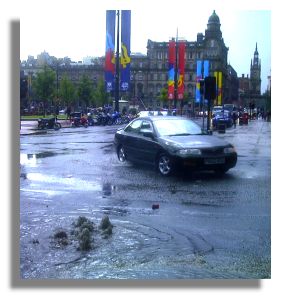 Statistics published this week confirm what we all knew - Scotland is getting wetter. The number of days with heavy rain has increased by over 50% compared with 40 years ago, and records keep getting broken. Last month, the Glasgow weather centre recorded rain on 28 days out of 31, with a total of 6 inches (150mm). December 1999 was one of the wettest on record, with over 12 inches of rain in Glasgow. Global warming and increasing numbers of days with moist south-westerly winds are at the root of the extra precipitation. The increased rainfall is causing more rivers to burst their banks and flood surrounding areas. This is not just confined to Scotland, of course; England is experiencing even more problems due to persistent rain and rivers which cannot cope.
Statistics published this week confirm what we all knew - Scotland is getting wetter. The number of days with heavy rain has increased by over 50% compared with 40 years ago, and records keep getting broken. Last month, the Glasgow weather centre recorded rain on 28 days out of 31, with a total of 6 inches (150mm). December 1999 was one of the wettest on record, with over 12 inches of rain in Glasgow. Global warming and increasing numbers of days with moist south-westerly winds are at the root of the extra precipitation. The increased rainfall is causing more rivers to burst their banks and flood surrounding areas. This is not just confined to Scotland, of course; England is experiencing even more problems due to persistent rain and rivers which cannot cope.
The illustration is of water bubbling up in George Square, Glasgow, following a heavy downpour.
Historical Affairs
Siege of Dunkeld
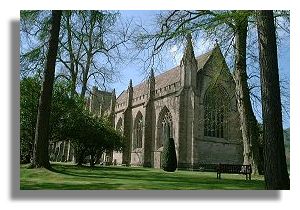 The Siege of Dunkeld in 1689 was commemorated last weekend in the Perthshire town, with a march of clan representatives through the streets to the 13th century Dunkeld Cathedral. A service was held at the cathedral's nave which was destroyed by fire during the siege and at the site of a Jacobite mass grave. The battle in Dunkeld arose after the Battle of Killiecrankie when Highlanders loyal to King James VII descended on the Cameronians who were Covenanters. Much of the town was destroyed and the present attractive town is the result of the rebuilding which followed. The name Dunkeld is derived from "the fort of the Celts" and St Columba may have founded the first monastery there. Kenneth MacAlpin made Dunkeld his capital in the 9th century.
The Siege of Dunkeld in 1689 was commemorated last weekend in the Perthshire town, with a march of clan representatives through the streets to the 13th century Dunkeld Cathedral. A service was held at the cathedral's nave which was destroyed by fire during the siege and at the site of a Jacobite mass grave. The battle in Dunkeld arose after the Battle of Killiecrankie when Highlanders loyal to King James VII descended on the Cameronians who were Covenanters. Much of the town was destroyed and the present attractive town is the result of the rebuilding which followed. The name Dunkeld is derived from "the fort of the Celts" and St Columba may have founded the first monastery there. Kenneth MacAlpin made Dunkeld his capital in the 9th century.
History of Ancient Port on Display
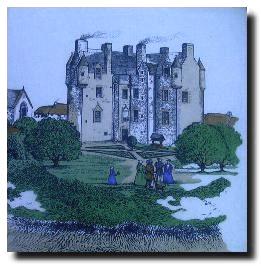 The extensive shipping history of one of Scotland's oldest port towns is the subject of a new exhibition in Dumfries and Galloway which runs to 1st of December. 'The History of the Port of Kirkcudbright,' at the Stewartry Museum, Kirkcudbright, is largely based on copies of early print illustrations and photographs of the port and River Dee, supported by objects and documents from the museum collection. The first documentary reference to trade and shipping at the port dates to 1236 when a person named Erkin of Kirkcudbright was given permission by the King to sail to Ireland to conduct trade in corn. The earliest illustration of the port dates to 1566, when an English spy sketched the town and the Dee estuary to accompany an intelligence report on the town, made for his masters in London. A copy of this sketch is shown in the exhibition. For more information on the Stewartry Museum visit www.dumfriesmuseum.demon.co.uk/stewmuse.html.
The extensive shipping history of one of Scotland's oldest port towns is the subject of a new exhibition in Dumfries and Galloway which runs to 1st of December. 'The History of the Port of Kirkcudbright,' at the Stewartry Museum, Kirkcudbright, is largely based on copies of early print illustrations and photographs of the port and River Dee, supported by objects and documents from the museum collection. The first documentary reference to trade and shipping at the port dates to 1236 when a person named Erkin of Kirkcudbright was given permission by the King to sail to Ireland to conduct trade in corn. The earliest illustration of the port dates to 1566, when an English spy sketched the town and the Dee estuary to accompany an intelligence report on the town, made for his masters in London. A copy of this sketch is shown in the exhibition. For more information on the Stewartry Museum visit www.dumfriesmuseum.demon.co.uk/stewmuse.html.
The illustration is of Castle MacLellan in the heart of Kirkcudbright.
Abbotsford at Risk
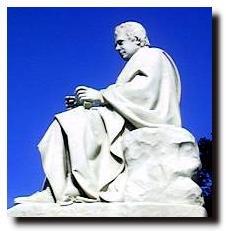 Sir Walter Scott's Border home at Abbotsford, on the banks of the river Tweed near Galashiels, has seen visitor numbers at an all-time low this year, threatening the future of the private manor house. The house is owned by Dame Jean Maxwell-Scott, a direct descendant of Sir Walter. She says that the decline is not just due to reduced numbers of tourists due to foot and mouth disease earlier in the year and the aftermath of September 11. She believes that there is a decline in interest due to the fact that Scott's works are no longer part of the curriculum in Scottish schools. There have been only 31,500 paying visitors this year, down on the 40,000 of the previous year and well down on the 86,000 visitors in the 1970s.
Sir Walter Scott's Border home at Abbotsford, on the banks of the river Tweed near Galashiels, has seen visitor numbers at an all-time low this year, threatening the future of the private manor house. The house is owned by Dame Jean Maxwell-Scott, a direct descendant of Sir Walter. She says that the decline is not just due to reduced numbers of tourists due to foot and mouth disease earlier in the year and the aftermath of September 11. She believes that there is a decline in interest due to the fact that Scott's works are no longer part of the curriculum in Scottish schools. There have been only 31,500 paying visitors this year, down on the 40,000 of the previous year and well down on the 86,000 visitors in the 1970s.
The illustration is of the monument to Sir Walter Scott in Princes Street, Edinburgh.
Entertainment
Fair Winds for Bigger, Better Museum
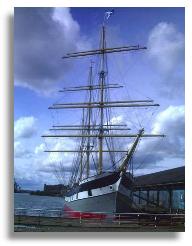 Regular readers of this Newsletter may recall that Glasgow City Council had announced plans to create a new and larger transport museum as part of the £500 million Glasgow Harbour scheme. This is being developed jointly by the Council and Clydeport on the west bank of the river Kelvin as it joins the river Clyde. But now consideration is being given to creating the transport museum on the west bank of the Kelvin and provide a bigger emphasis on the maritime elements of the museum. It would also be close by the existing Clyde Maritime Trust museum with its sailing ship Glenlee (illustrated here) moored at the quayside. The Clyde used to be one of the largest shipbuilding centres in the world. During the 19th and 20th centuries 30,000 ships were built on the river and 50,000 locomotives were exported by ship from Glasgow factories. The plan now is to fill a large part of Yorkhill basin, using the spoil from the demolition of the Meadowside Granary. It is being pointed out that many of the exhibits at the Maritime Museum at Irvine and at Summerlee Heritage Park are on loan from Glasgow.
Regular readers of this Newsletter may recall that Glasgow City Council had announced plans to create a new and larger transport museum as part of the £500 million Glasgow Harbour scheme. This is being developed jointly by the Council and Clydeport on the west bank of the river Kelvin as it joins the river Clyde. But now consideration is being given to creating the transport museum on the west bank of the Kelvin and provide a bigger emphasis on the maritime elements of the museum. It would also be close by the existing Clyde Maritime Trust museum with its sailing ship Glenlee (illustrated here) moored at the quayside. The Clyde used to be one of the largest shipbuilding centres in the world. During the 19th and 20th centuries 30,000 ships were built on the river and 50,000 locomotives were exported by ship from Glasgow factories. The plan now is to fill a large part of Yorkhill basin, using the spoil from the demolition of the Meadowside Granary. It is being pointed out that many of the exhibits at the Maritime Museum at Irvine and at Summerlee Heritage Park are on loan from Glasgow.
50,000 Attend Fireworks Display
On 5 November (Guy Fawkes night - see Did You Know? Guy Fawkes if you want to find out the background to this) 50,000 people attended the fireworks display on Glasgow Green. Numbers were down from last year but this was no doubt due to the appalling wind and rain and the fact that it was a week-day night. Due to the high winds, some of the largest fireworks were not included in the display.
Artist Attacks Public Art
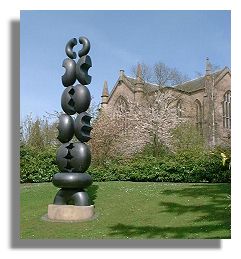 The creation of five new sculptures in Tay Street, Perth, was attacked this week by artist Charles Harris who accuses the Perthshire Public Art Trust (made up largely of local politicians and civic officials) of promoting only modern art instead of also backing works with "traditional" values - such as his sculpture of the "Three Graces". Perth has made quite a name for itself by funding a large number of art works in public spaces - Norrie Miller Park, Rodney Gardens and Bellwood Riverside Park are full of modern sculptures and there are many other examples around the city - including a far from modern sculpture of the Fair Maid of Perth, sitting demurely in a shopping precinct. The Trust claims that it takes on board all comments from the public but point out that Mr Harris' latest submission for Tay Street incorporates three female nudes. The Trust says that the potential for vandalism is great and that "Perth doesn't display three naked ladies in public".
The creation of five new sculptures in Tay Street, Perth, was attacked this week by artist Charles Harris who accuses the Perthshire Public Art Trust (made up largely of local politicians and civic officials) of promoting only modern art instead of also backing works with "traditional" values - such as his sculpture of the "Three Graces". Perth has made quite a name for itself by funding a large number of art works in public spaces - Norrie Miller Park, Rodney Gardens and Bellwood Riverside Park are full of modern sculptures and there are many other examples around the city - including a far from modern sculpture of the Fair Maid of Perth, sitting demurely in a shopping precinct. The Trust claims that it takes on board all comments from the public but point out that Mr Harris' latest submission for Tay Street incorporates three female nudes. The Trust says that the potential for vandalism is great and that "Perth doesn't display three naked ladies in public".
Glasgow's Christmas Lights Switched On
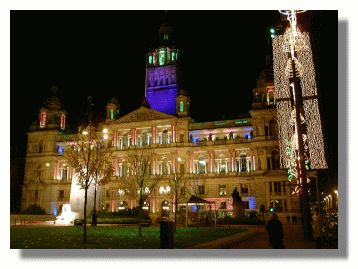
The largest display of Christmas lights in Glasgow were switched on last weekend (by a four-year-old girl who won a competition) - as more than 20,000 Glaswegians poured into the city to see the accompanying fireworks display. If you have been calling in at the City of Glasgow webcam which overlooks George Square you may also see the much larger area which has been allocated this year to the ice rink (which is not yet operational). See www.glasgow.gov.uk/html/about/wcindex.htm
|


The Scottish Snippets Newsletter in its original format began in April 1997 and continued in an unbroken series for 591 issues. Although no longer produced in that format there is now a regular update on the new and updated pages on the Rampant Scotland site and also "Scottie's Diary" on an intermittent basis, To receive this, kust send an e-mail to Scottie with "Subscribe Newsletter" in the subject line.
 July 2001
July 2001 August 2001
August 2001 September 2001
September 2001 October 2001
October 2001 November 2001
November 2001 December 2001
December 2001 Culture Magazine
Culture Magazine
